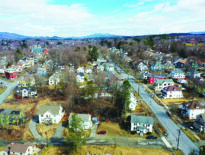
Yovani Baez-Rose
If you haven’t been paying close attention, you may not realize that Lowell is on the cusp of big things.
The Urban Economy Forum recently named Lowell the first U.S. “frontrunner city” which will put us on the global stage, opening up incredible opportunities for investment and information exchange.
Leveraging our strong educational environment, natural beauty of the rivers and canals, and large development opportunities, this is an opportunity that will bring transformative changes to Lowell, and we could not be more excited about what’s to come.
Specifics of what that will entail are still being hammered out but more immediate opportunities to invest in Lowell are on the table, and we want to invite you to take a deeper look.
The Stakeholders Are Aligned
The recently adopted Lowell Forward master plan gives a sense of where we aim to take the city over the course of the next two decades.
Although Lowell is no stranger to community planning, Lowell Forward represents the most inclusive and comprehensive planning exercise by the city to date, encapsulated by the feedback from hundreds of residents over the course of dozens of meetings.
By bringing so many stakeholders to the table, we have a high degree of confidence in what the community wants to see in the future, which bodes well for buy-in once proposals come through.
Lowell Forward is as much as planning document as it is a statement of intent.
Ours is a city where opportunity is bountiful and we are turning to the business community to help us turn planning into action. This means attracting investments for new, thriving commercial developments, mixed-use projects and a variety of residential projects that can integrate into the distinctive culture of the Lowell community.
Lowell’s Goals
More specifically, we are looking to improve the quantity of housing options (including homeownership opportunities) while maintaining affordability. We also want to make Lowell easier to get around regardless of your preferred means, including enhanced connections over canals.
We hope to improve the built environment downtown by targeting infill development opportunities in the Merrimack corridor area and the area around the Gallagher Station to bring density without disrupting the character of the city.
And we seek to to grow public spaces to maximize recreational opportunities and to draw in families that will patronize local shops and eateries.
These are goals that can generate positive outcomes for a business and Lowell, simultaneously.
These goals are tangible and within reach.
A portion of our MBTA Communities Act overlay district overlaps with our existing Jackson Appleton Middlesex urban renewal area, providing attractive development prospects with proximity to transit and Lowell’s central business district. Importantly, this area includes several single-story properties and vacant parcels ripe for infill development that can introduce hundreds of units of housing without displacement.
You’re a Partner, Not an Adversary
When we say that Lowell is open for business, we mean it.
When we sit down with developers, we approach these conversations as prospective partnerships, not adversarial maneuvering. Upfront and transparent conversations with developers can quickly determine if Lowell is a fit for their project – and vice versa.
We are committed to streamlining the development process because we know that time is money.
Recognizing the abundance of municipally owned parking lots, the City Council removed on-site parking requirements for projects of 10 units or fewer within the Downtown Mixed-Use (DMU) zone last year. This change was proactively initiated to help ensure a more efficient approval process, reducing the need for variance requests, and to show the development community we are serious about not wasting their efforts.
If the goal is to invest in Lowell, our goal is to help make those projects a reality. That means assigning a single point of contact so there is no confusion about who to call when there is a question or a concern. By working together, we can ensure that proposals align with, and deliver on, the goals laid out in Lowell Forward.
As much as the Lowell Forward plan notes what we’d like to see, we understand that zoning needs to be modernized to clear a pathway for desired uses to move forward. This piece is critical, and we have already begun this process, with significant changes expected by next year.
With a rich history to be inspired by, a thriving arts and culinary scene, an educated local workforce, and ample development opportunities, there’s no shortage of reasons to give Lowell a closer look. And we are here to answer any questions you might have. The time to invest in Lowell is now. Let’s bring Lowell forward, together.
Yovani Baez-Rose is the assistant city manager and director of planning and development in Lowell.





